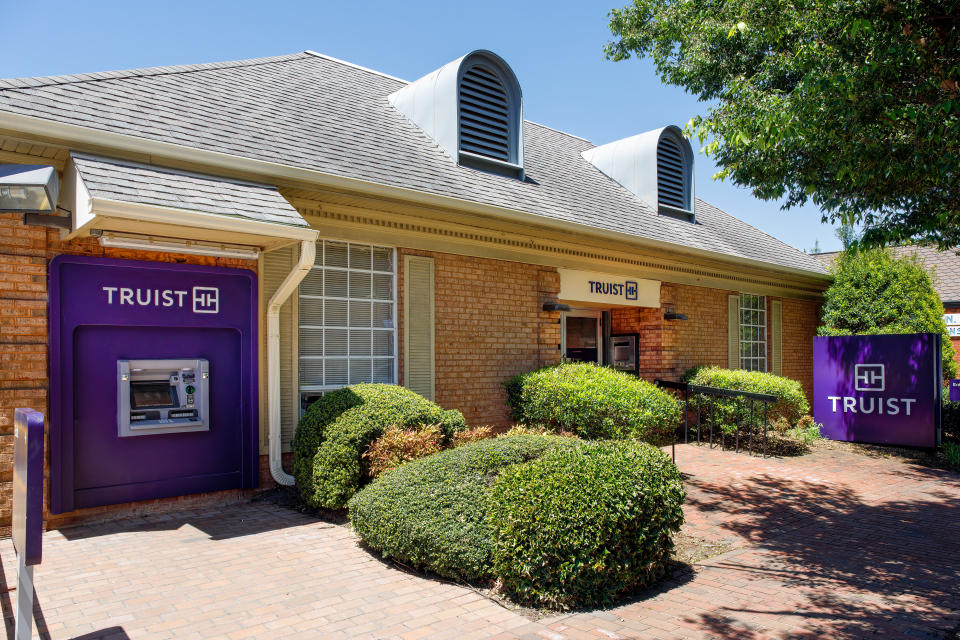Several of the nation’s best-known midsized lenders reported sizable drops in profits during the fourth quarter, a reminder of how challenging 2023 was.
The problem is that things aren’t expected to get much better in 2024.
The stock of Discover Financial Services (DFS) fell 11% Thursday after it reported that earnings fell 62% from the year-ago period. KeyCorp (KEY) fell by more than 4% after it said profits dropped 36%. Truist (TFC) rose slight after falling for most of the afternoon. It posted a net loss of $5 billion, its worst quarterly result ever.
Regional banks are generally on more stable ground than they were during the first half of last year, when the failures of Silicon Valley Bank, Signature Bank, and First Republic triggered panic about the strength of many other mid-sized banks across the US.
Their stocks even surged late in 2023 as investors became more convinced the Federal Reserve was ready to start cutting sky-high interest rates as early as March. Such a move would help many regional banks that watched their profits plunge as deposits became more expensive.
But it is not yet clear when those rate cuts will happen, and stocks are now falling back as policymakers pump the brakes on market expectations for a loosening in the first quarter.
The uncertainty around rates means regional banks will continue to struggle with a key measure of profitability known as net interest income — which measures the difference between what banks earn on their loans and pay out on their deposits.
That income fell at many regional banks during the fourth quarter, and some said they expect it to fall during 2024 as well, even if the Fed does eventually begin to cut.
“You’ve had degradation in operating conditions for the industry,” Truist CFO Mike Maguire told analysts Thursday.


Truist’s $5 billion quarterly loss was due largely to a massive non-cash goodwill impairment charge of $6.1 billion that the bank said reflects the impact of higher rates on the entire industry.
“A scenario where there are no cuts … or significantly delayed cuts, that would be a headwind for us,” Maguire added.
The Charlotte, N.C.-based bank — which is considerably smaller than giants like JPMorgan Chase (JPM) but remains among the 10 largest lenders in the US — also took a one-time $507 million charge for a special assessment it paid to the Federal Deposit Insurance Corporation.
Other banks paid similar assessments, which are being used by the FDIC to replenish a fund used to cover losses stemming from the Silicon Valley Bank and Signature Bank failures in 2023.
KeyCorp, a regional bank based in Cleveland, said its net interest income fell more than 24% in the fourth quarter from a year earlier.
It expects that measure on a tax equivalent basis to be down 2-5% in 2024 despite what it expects will be two to five rate cuts from the Fed, starting in March.


“We acknowledge 2023 was a challenging year. Difficult but necessary decisions were made and actions were taken,” CEO Chris Gorman told analysts Thursday. This year “we’re managing the business for a short recession.”
M&T (MTB), a regional bank based in Buffalo, anticipates its net interest income will be down 5% to 6.5% in 2024.
Its CFO, Daryl Bible, told analysts that lower rates would help its commercial lending and investment banking businesses.
“I get kind of excited, you know, if the Fed just lowers rates just a little bit,” Bible said.
David Hollerith is a senior reporter for Yahoo Finance covering banking, crypto, and other areas in finance.
Click here for in-depth analysis of the latest stock market news and events moving stock prices.
Read the latest financial and business news from Yahoo Finance

















